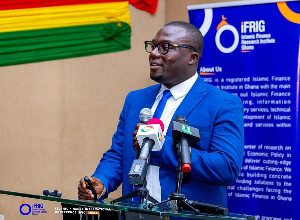 Dr. Shaibu Ali, Director General, Islamic Finance Research Institute, Ghana.
Dr. Shaibu Ali, Director General, Islamic Finance Research Institute, Ghana.
As the Director of the Islamic Finance Research Institute of Ghana (IFRIG), I firmly believe that non-interest financing holds significant potential to reshape Ghana’s economic landscape.
With a GDP of $77.6 billion and a debt-to-GDP ratio hovering around 85%, the country is grappling with the limitations of traditional, interest-based loans.
The growing national debt is becoming unsustainable, and there is a pressing need to explore alternative financing options that foster sustainable growth while reducing financial burdens. Non-interest financing, or Islamic finance, provides a promising solution.
In our current banking environment, the situation is concerning. Non-performing loans (NPLs) have surged to 24.3 % in August 2024, signaling the difficulties businesses face in managing their debts as interest rates continue to rise. With the Bank of Ghana’s policy rate now at 27% and highest in Africa, borrowing has become costly, slowing down economic activity.
Non-interest financing, based on principles of risk-sharing and asset-backed investments, offers a better alternative to businesses that are seeking more affordable ways to access capital.
Islamic finance instruments, such as sukuk (Islamic bonds) and musharakah (joint venture financing), operate on the premise of shared risk and profit-and-loss sharing. These instruments are increasingly relevant, especially as global Islamic finance assets are set to exceed $3 trillion by 2024.
By embracing this system, Ghana could attract foreign investment from regions like the Middle East, North Africa, and Southeast Asia, where Sharia-compliant financial practices are well-established. These new sources of capital could be directed toward vital infrastructure projects like roads, rail, energy, and housing where Ghana needs an estimated $30 billion in investment over the next decade.
From a banking perspective, the introduction of non-interest financial models could transform our sector. Ghana’s banking industry, while strengthened through reforms such as the 2017 recapitalization exercise, remains heavily dependent on interest-based lending.
The establishment of Islamic banks or windows within existing banks could create a new, diversified financial ecosystem that serves a broader segment of society. This would also open Ghana up to partnerships with countries that have deep Islamic finance traditions, such as Saudi Arabia and Malaysia, further enhancing trade and investment opportunities.
At IFRIG, we are working closely with stakeholders, including the Bank of Ghana and other state institutions, to lay the groundwork for Islamic finance in Ghana. Our goal is to ensure that the regulatory framework is robust, adaptable, and conducive to non-interest financial products. We are also focused on educating the public and businesses about the opportunities that non-interest financing presents not just as an alternative, but as a catalyst for inclusive economic development.
Incorporating non-interest financing into Ghana’s economic strategy is not just a financial necessity, but a step toward creating a more ethical, resilient, and diversified economy. By adopting this model, we can reduce our reliance on conventional debt, foster sustainable growth, and build a future where economic development is shared by all Ghanaians.
Dr. Shaibu Ali
Director General
Islamic Finance Research Institute, Ghana.